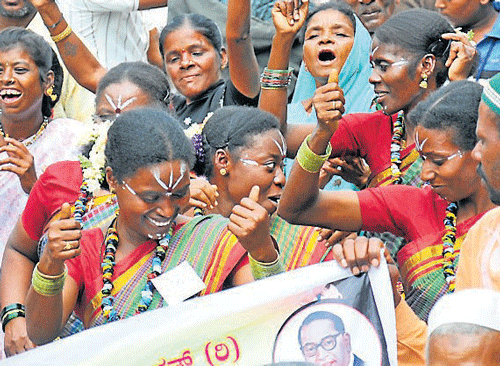
The High Court Committee report on the Tribal Issues of Rajiv Gandhi National Park, Nagarahole, has recommended the State government for internal reservation of tribals, who have been displaced due to various factors, including declaration of national park and reserves.
The Committee, which submitted its report after a decade long study has also highlighted that tribals from Nagarahole National Park, displaced after the enactment of Wildlife Act, 1972, continue to live in abject poverty and lack basic facilities.
“The persistent poverty of tribals is the result of structural constraints caused due to public policy on national parks and wildlife. Despite numerous schemes and programmes, tribals suffer from ‘development deficit’ and exclusion,” said Muzaffar Assadi, Professor of Political Science, University of Mysore who chaired the Committee.
Other members of the three member Committee include Jaji Thimmaiah, tribal representative and C Srinivasan, APCCF (Project Tiger), who represented the Forest department.
The Committee was formed to look into the actual number of families and persons displaced or forced to leave their original habitat on account of establishment of Rajiv Gandhi National Park, also known as Nagarhole National Park.
Recommendations
In the first such report on ‘Public Policy’ displacement in the State, caused due to Wildlife Act, 1972, Assadi apart from recommending for internal reservation of displaced tribals, has suggested the State government to come up with a special plan for such displaced tribals.
“While rehabilitation package has been offered to tribals who volunteered to move from the forest to resettlement camps, tribals have been granted dry or unfertile land, with scarce water resources. Such lands should be replaced by fertile land,” the report said.
Areas inhabited by displaced primitive and forest tribes should be declared as Scheduled Area, and tribals should be issued BPL cards and enlisted under insurance schemes of the government, the Committee has recommended.
The report also recommends withdrawing all pending cases against tribes, booked under grounds such as ‘trespassing’, ‘collecting honey’ and ‘setting fire to forest’, to build confidence between tribals and the political apparatus.
Poor rehabilitation
Of the 3,418 tribal families displaced from Nagarahole National Park, following the enactment of Wildlife Act, 1972, less than 50 per cent of them have houses, said the report.
The study has highlighted the impoverished conditions of such tribals and recommended several measures to improve their standard of living.
Among the 3,418 families, only 1,568 (45.87 per cent) have houses, while 838 families (24.51 per cent) own any property. A total of 11, 568 persons have been displaced, the report submitted to the State government recently, said.
The study, found that 1,738 families, with a population of 6,102 still reside inside the National Park spread across Mysore and Kodagu districts. Of them, only 592 had houses, while the number of families claiming tenancy rights inside the reserves was 87.
A portion of the displaced tribals were identified and rehabilitated at Veeranhosahally, Sollepura and Shettihalli Lakpatna resettlement camps. However, almost four decades after the rehabilitation efforts began, condition of such tribals has remained poor.
The report found that houses constructed in some resettlement camps, including Nagapura, were in shabby condition and not big enough to accommodate large families.
Tribals, who went from hunter-gatherers to farmers for the first time, had little had no training in farming, owing to which they sub-leased the land allotted for them for cultivation.
“After sub-leasing their lands to grow ginger and tobacco to other farmers, tribals themselves remain unemployed and migrate to coffee estates in search of jobs,” the report said.
Apart from such problems, resettlement camps or haadis, face acute problem of water supply.
